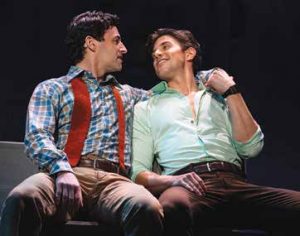By Erik Piepenburg–
When Sylvester or Justin Timberlake songs play, the heart soars and swoons. It’s not only because of their magnificent music but also because something about singing in falsetto elicits a feeling in us that sends us into another dimension. When a man sings in falsetto, it is when they are singing notes higher than their normal range—much like the title of the Tony Award-winning musical Falsettos, now playing at the SHN Golden Gate Theatre through April 14. It’s a title inspired by people who exist “outside the normal.”
Falsettos is a heartfelt and thought-provoking show about a modern family as they try to figure out where they stand in a complicated world. Set in the 1980s, Falsettos tells the story of Marvin, who comes out as gay and leaves his wife Trina for Whizzer, a younger man, much to the chagrin of Jason, Marvin and Trina’s 12-year-old soon to be Bar Mitzvah’d son. Also within this extended family circle are Mendel, Trina’s new husband, and Whizzer’s doctor Charlotte and her lover, Cordelia. It’s a family based in, as Armistead Maupin has so famously noted, “both biological and logical roots.”
“It’s about a family and a husband and wife, and that’s about as small and regular and normal everyday life as we can get,” said the producer Jordan Roth. “But then it’s about these enormous ideas that sit above that, like what it is to be a family, to be human, to love, to parent, to connect with another person.”
 The show is actually a combination of two one-act musicals, March of the Falsettos and Falsettoland that composer William Finn and book-writer and director James Lapine wrote in the early 1980s. Both premiered at Playwrights Horizons, an Off-Broadway theater, and together opened on Broadway in 1992 as Falsettos. The show was a hit, winning Tony Awards for best score and best book.
The show is actually a combination of two one-act musicals, March of the Falsettos and Falsettoland that composer William Finn and book-writer and director James Lapine wrote in the early 1980s. Both premiered at Playwrights Horizons, an Off-Broadway theater, and together opened on Broadway in 1992 as Falsettos. The show was a hit, winning Tony Awards for best score and best book.
In 2016, a new production of Falsettos received glowing reviews and five Tony nominations when it returned to Broadway. The New York Times called it an “exhilarating, devastating revival” that surges “with such vitality that it feels as fresh and startling as it did back in 1992.”
“Its fundamental subject,” said the review, “is that mysterious, maddening, uplifting, life-complicating emotion we refer to as love, which hasn’t changed in 25 years.”
For Finn, those words were thrilling to read.
“The New York Times said it was a perfect version of a perfect musical and that was surprising,” he said with a laugh. “I didn’t know it was perfect. I was thrilled to find out it was.”
Falsettos is most notable for its timeless message. The songs convey “what people’s hearts sound like,” as Roth put it. The characters “are literally singing their souls and their every thought, and not just their really big thoughts as often is the case in musicals,” he said.
Lapine, who directed both the original and the new revival, said mounting the show was a shot in the dark, not because it wasn’t worthy of being revisited, but because among the difficult topics it explores is the AIDS epidemic in its early days. The original production opened on Broadway as the crisis hit New York City especially hard.
“It was very touching for all of us, particularly a lot of people in the theater who knew people who were struck by the disease and lost friends,” remembers Lapine. “It became a very emotional experience when it opened.”
 Any trepidation over the decision to bring Falsettos back was erased the night of the revival’s first performance on Broadway.
Any trepidation over the decision to bring Falsettos back was erased the night of the revival’s first performance on Broadway.
“People who had seen it the first time came back to see it,” Lapine said. “People who have since had children and families of their own brought their families back to see it. A whole younger generation who grew up listing to the cast albums, putting it on at colleges and schools, came to see it. The reception was well beyond anything any of us expected. It was a kind of welcoming home.”
The diversity expressed in the show—of family, identity and sexuality—is something every audience member can relate to. There are characters who look familiar and characters who don’t. Every song has a universal quality that will resonate for audiences no matter where they live or what their beliefs are.
“Theater is a way in for all of us,” said Lapine. “We get to spend a little bit of time coming to know someone in that very personal way that only theater reveals. That’s how we change hearts and minds: change hearts first.”
Erik Piepenburg is a theater buff and a former Senior Staff Editor at “The New York Times.”
SHN is pleased to partner with the San Francisco Bay Times in supporting our LGBTQ community. Throughout the run of Falsettos, SHN will donate $10 for every ticket sold to organizations that are at the forefront of recognizing our community’s past and building a more secure future. When purchasing a ticket for Falsettos, enter one of the following codes to help support the organization of your choice:
AIDS Memorial Grove
Code: GROVE
San Francisco Gay Men’s Chorus
Code: SFGMC1
PRC
Code: PRC1
Openhouse
Code: HOUSE
For more information about Falsettos and to purchase tickets, so to: https://bit.ly/2TKXRNj
Recent Comments